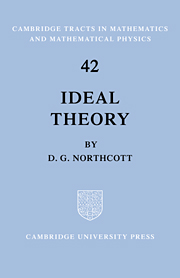Book contents
- Frontmatter
- Contents
- Author's Preface
- Preliminaries
- Chapter I THE PRIMARY DECOMPOSITION
- Chapter II RESIDUE RINGS AND RINGS OF QUOTIENTS
- Chapter III SOME FUNDAMENTAL PROPERTIES OF NOETHERIAN RINGS
- Chapter IV THE ALGEBRAIC THEORY OF LOCAL RINGS
- Chapter V THE ANALYTIC THEORY OF LOCAL RINGS
- Notes
- References
- Index of Definitions
Chapter I - THE PRIMARY DECOMPOSITION
Published online by Cambridge University Press: 12 October 2009
- Frontmatter
- Contents
- Author's Preface
- Preliminaries
- Chapter I THE PRIMARY DECOMPOSITION
- Chapter II RESIDUE RINGS AND RINGS OF QUOTIENTS
- Chapter III SOME FUNDAMENTAL PROPERTIES OF NOETHERIAN RINGS
- Chapter IV THE ALGEBRAIC THEORY OF LOCAL RINGS
- Chapter V THE ANALYTIC THEORY OF LOCAL RINGS
- Notes
- References
- Index of Definitions
Summary
A convention. Now that we have given a formal definition of a ring, we can begin the systematic development of our subject. The rings that we shall consider will all be commutative, and they will all have a unit element. It is therefore convenient to use the word ‘ring’ in a more restricted sense than is customary in modern algebra, and for this reason we lay down the following convention: From now on ‘ring’ will always mean a commutative ring with a unit element. The zero element and the unit element of a ring R will be denoted by 0 and 1 respectively, or, if we are concerned with several rings at the same time, by 0R and IR.
Ideals and their calculus. Let R be a ring (commutative and with a unit element), and let a be a non-empty subset of R, then a is called an ideal of R in all cases where the following two conditions are satisfied:
Whenever a1 and a2 belong to a, then a1 ± a2 both belong to a.
If a ∈ a, then ra ∈ a for all r ∈ R.
A trivial example of an ideal is obtained by taking a to be the whole ring.
- Type
- Chapter
- Information
- Ideal Theory , pp. 4 - 30Publisher: Cambridge University PressPrint publication year: 1953

